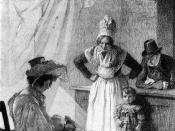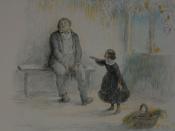For Lack of a Better Man
Gustave Flaubert presents one extreme side of human life many would very much rather think does not exist. He presents a tale of sensual symbolism within the life of Charles Bovary. Madame Bovary is the story of Emma Bovary, but within the scope of symbolic meaning, the make-up of Charles is addressed. It is representative of deep sadness and a despondent outlook on life whose many symbols are, at times, as deeply embedded in the story line as a thorn in a callous heel. The elements making up the very person of Charles Bovary remain excruciatingly evident, haunting his every move.
Symbolic of his yearning for inner fulfillment, Charles Bovary presents to be a man in search of an unknown sensual satisfaction. It is no wonder, with the detailed writing the French government attempted to censor Flaubert when Madame Bovary was published in 1856.
Although the vast majority of theorems penned revolve about the life of Emma, the character of Charles requires examining.
In the opening scenes, Charles Bovary is seen entering a favorite "dive" of escape, an escape from the realities of life. The cafés he frequented appear as "dirty public rooms" (Flaubert 834) housing his passion for the game of dominoes. His obsession and pleasure from this simple entertainment are exposed as Flaubert describes Charles entrance into the den of dominoes. "[His esteem] was beginning to see life, the sweetness of stolen pleasures; and when he entered, he put his hand on the door handle with a joy almost sensual" (Flaubert 834). What, other than a profound uneasiness within his personal life, could bring about so explicit a pleasure from the entering to a dark, dank room?
Charles' life as a student of medicine is one of avoidance. His lack of...


